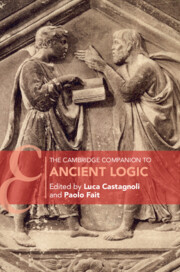Book contents
- The Cambridge Companion to Ancient Logic
- Other Volumes in the Series of Cambridge Companions
- The Cambridge Companion to Ancient Logic
- Copyright page
- Contents
- Contributors
- Introduction
- I The Development of Logic in Antiquity
- II Key Themes
- 5 Truth as a Logical Property and the Laws of Being True
- 6 Definition
- 7 Terms and Propositions
- 8 Validity and Syllogism
- 9 Demonstration
- 10 Modalities and Modal Logic
- 11 Fallacies and Paradoxes
- 12 Logic in Ancient Rhetoric
- 13 Ancient Logic and Ancient Mathematics
- III The Legacy of Ancient Logic
- Bibliography
- Abbreviations
- Index of Passages
- General Index
- Other Volumes in the Series of Cambridge Companions
6 - Definition
from II - Key Themes
Published online by Cambridge University Press: 29 April 2023
- The Cambridge Companion to Ancient Logic
- Other Volumes in the Series of Cambridge Companions
- The Cambridge Companion to Ancient Logic
- Copyright page
- Contents
- Contributors
- Introduction
- I The Development of Logic in Antiquity
- II Key Themes
- 5 Truth as a Logical Property and the Laws of Being True
- 6 Definition
- 7 Terms and Propositions
- 8 Validity and Syllogism
- 9 Demonstration
- 10 Modalities and Modal Logic
- 11 Fallacies and Paradoxes
- 12 Logic in Ancient Rhetoric
- 13 Ancient Logic and Ancient Mathematics
- III The Legacy of Ancient Logic
- Bibliography
- Abbreviations
- Index of Passages
- General Index
- Other Volumes in the Series of Cambridge Companions
Summary
In considering the place and importance of definitions in ancient logic,1 the most appropriate point of departure is Aristotle’s commendation at Metaphysics 1.6, 987b1–3 of the historical Socrates (as opposed to the character portrayed in the Platonic dialogues) for being the first to focus attention on definitions in the course of his ethical inquiries, an unmistakable reference to early ‘definitional’ dialogues such as the Euthyphro, Laches, Charmides, and Meno.2 None of these works contains any occurrences of Aristotle’s term for definition, horismos, or its close relative, horos,3 but this does not automatically undermine Aristotle’s ascription. In the ethical inquiries represented in these dialogues Socrates typically begins by identifying someone who is reputed to possess expertise concerning one or another of the ethical virtues (viz. temperance, courage, justice, or piety), and then insists that anyone who really possessed such expertise should be able to say what is the object of her alleged expertise. Consequently, Socrates demands that his interlocutors produce defensible answers to questions of the form, ‘What is X?’, (ti esti X;) where appropriate substituends of ‘X’ are names of the individual virtues. For example, when the title character of the Euthyphro informs Socrates that he is prosecuting his own father for murder on a highly dubious factual basis, Socrates declares that to undertake this prosecution Euthyphro must have ‘precise’ (akribōs) knowledge of piety and impiety, and in that case he should be able to answer the questions ‘What is piety?’ and ‘What is impiety?’ (Euthyphro 4e–5d). Inasmuch as this form of question can plausibly be construed as a demand to be told what distinguishes X things from everything else, or in other words, to be given a definition of X, if we assume that Plato’s portrayal of Socrates in these texts is accurate, then they seem to support Aristotle’s historical contention that Socrates sought definitions of the virtues as part of his ethical research program.
- Type
- Chapter
- Information
- The Cambridge Companion to Ancient Logic , pp. 128 - 146Publisher: Cambridge University PressPrint publication year: 2023
- 2
- Cited by

